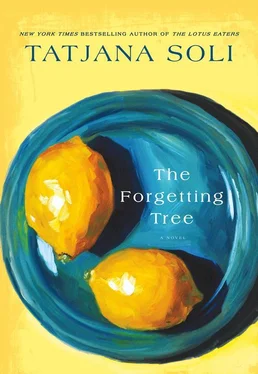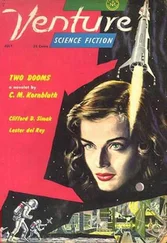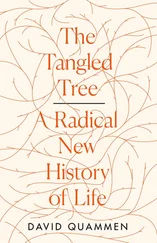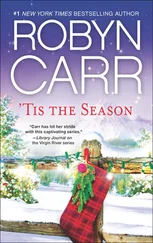Minna came in with breakfast. “What’s wrong? Are you sick?”
Claire shook her head and pointed, accusing, to the pillow, speechless. Mrs. Girbaldi was expected for lunch, but Claire wanted to hide forever in her bed.
“Oh,” Minna said, and set the tray on the floor, sat on the bed, and took her in her arms. She rocked Claire like a child, till she was soothed. Claire felt too destroyed to be reserved or shy. She cried abjectly, all self-consciousness and inhibition gone. In just such a way, she had comforted her girls when, inconsolable, they grieved over the death of a pet, or some other long-forgotten misfortune. To them such grief was deadly serious, and she treated it as such. Likewise, no matter how foolish she might appear now, the sick had privileges. She would be forgiven by Minna. Rage and confusion poured out. When she finally settled down, Minna kissed her forehead and said, “Now that’s over, we must get to work.”
After Claire had dressed, Minna placed her on a kitchen stool (the same stool that Claire had used to cut Gwen’s, Lucy’s, and Josh’s hair) and took out a small pair of silver sewing scissors and began to snip the last straggly remnants. Each cut strand carefully placed on an outspread cloth, added to that from the pillow, not allowed to fall on the ground, sparing her evidence of her weakening, disappearing self. When Claire had only a soft buzz cut, Minna took out a razor and a can of shaving gel. As the razor skimmed Claire’s head, Minna hummed a tune Claire thought sounded like a lullaby she used to know. Claire looked out the window, pretending it was an ordinary haircut, pretending that all this was happening to someone else.
Ersulie nain nain oh! Ersulie nain nain oh!
Ersulie ya gaga gaaza, La roseé fait bro-
dè tou temps soleil par lévé La ro seé fait bro-
dè tou temps soleil par lévé Ersulie nain nain oh!
The phone rang — Gwen’s day — and Claire motioned to Minna the excuse that she was asleep. Minna talked on the phone several minutes, then hung up.
“You must let them know you are okay,” she said. “They will blame me.” Minna brought out a small jar of red paste and rubbed it on Claire’s head. “This is to soothe the skin.”
Claire nodded, eased by the gravelly, warm feel of the tincture, like sand mixed in warm honey, compared to her chilled nakedness without it. Her skull felt small and fragile as an egg.
Next Minna took out a small pot of brilliant blue liquid and a small paintbrush. “This is for good healing. The hair will grow more beautiful than before. I will make you as beautiful as the goddess Erzulie.”
Claire sat still and refused to think what she looked like, simply basked in Minna’s attention.
A knocking at the door, and Mrs. Girbaldi, as usual, let herself in. When she walked into the kitchen, her lipsticked mouth dropped open. “My lord, you look like a Purple People Eater.”
All three of them howled with laughter, and so Claire was able to survive into the next hour.
* * *
After lunch, Claire’s newly bald head wrapped in the magenta scarf, Minna led them single file out over the lawn. She sang the same song she sang earlier, but this time it was clear to Claire that it was familiar only in her attraction to it. At each turn, Minna threw a small curl of hair, then she gave them each a handful to accompany her. Bits of Claire were scattered over the lawn. Out of the corner of her eye, she saw Mrs. Girbaldi turn away and wipe at her face. Was it indeed a rehearsal of a funeral? But Claire did not feel ghoulish. She imagined her hair lining birds’ nests, squirrels’ dens, rabbit warrens. She herself, formerly insubstantial and windblown, would become rock solid, sinking down into the earth, forming roots that fingered their way down into the soil. Her hair, herself, resurrected.
* * *
Mrs. Girbaldi, caught in Claire’s need, stayed through the afternoon, read while she slept, made her famous corn-and-tomato soup for dinner. The phone rang, and Claire asked her to answer it. It was Lucy, alarmed by the news from Gwen that Claire wasn’t well.
“What do they expect? I’m going through chemo,” Claire said when the call was over.
“Why aren’t you talking to them?”
“Whenever they hear I’m ill, we start with the selling of the farm again.”
Mrs. Girbaldi shook her head. “But it’s just land. Not kin.”
“No! Those acres are as born from me as the children are. Maybe more so. The girls turned away from it all.”
Mrs. Girbaldi shook her head as if something valuable had been dropped and broken. “They escaped, child.”
“They betrayed.”
* * *
For dinner Claire lit candles at the kitchen table, pulled out the cloth napkins, creating a minicelebration. When Minna came downstairs, she wore tight jeans, high heels, a glittery, low-cut camisole that used to belong to Lucy when she was in college.
“Night,” she said, letting herself out the door, not bothering to look at the table with its three settings.
Mrs. Girbaldi spied on her out the kitchen window. “Where’s she going?”
“A date,” Claire said. “Just spoons? Or forks, too?”
“She goes out regularly?”
Claire shrugged. “Quite a few nights.”
“That’s not her job. Her job is to keep you company.”
“This is a job, not a prison sentence. I can’t expect her to take vows of celibacy, can I?”
“She spends the night? With who?”
A sly smile. “Don.”
“That was quick work.”
“I like having her here. It gets me through. And I have you, don’t I?”
“Of course. And you have your daughters. Have you forgotten about them?”
“No.”
“I think you have. This girl has bewitched you.”
“That’s ridiculous,” Claire said, but wondered if it was true.
“Something I wanted to talk to you about. I was at the club, having lunch with Margaret Parker. You know Margaret?”
Happy to change the subject, Claire nodded, wagging in a noncommittal motion as one did with Mrs. Girbaldi’s sprawling narratives, like genuflecting toward the points of the cross, indicating a familiarity, rather than intimacy, with said person.
Mrs. Girbaldi continued, undeterred, lowering her voice to a stage whisper. “Well, her cousin came down with the cancer.”
Claire smiled at the idea that one could come down with the cancer, as if it were the flu.
“They took her to a clinic down in Baja,” Mrs. Girbaldi continued. “They fed her all this strange stuff — I’m not saying what, but let’s just say it was a struggle getting it down, and it would be illegal in this country. A month later, she went back to her doctors, and they examined her: the tumor was gone! They accused her of having it operated on. ‘How could I do that,’ Margaret asked, ‘when you all said yourselves it was inoperable?’”
The story hung, unremarked upon, Claire’s attention directed away as if Mrs. Girbaldi had burped.
A week later, Minna invited Claire to her now transformed room.
The climate in California is ephemeral; the air brittle and self-effacing. Upon entering the room, Claire felt she had left her old world as she knew it. She understood for the first time the indolent pleasure of the wet and liquid air in those exotic novels that took place in the tropical corners of the world. Impossible to explain how a coat of paint could affect barometric pressure, but there it was. She was in a strange but longed-for land.
Two walls were painted dark greenish turquoise, a color that breathed the nearness of the ocean, its salty stick, the choking, crowding vegetation, and the torrential, silvered downpours of rain. Claire was positive if she touched these walls, her hand would come away slick, not with paint, but the breathing condensation of the equatorial climate. The walls modulated from light to shadow, as if one were looking down into the depths of a lagoon while sitting in a small, unseaworthy boat. A vertiginous experience that suggested to her the overwhelming feel of crossing a sea whose entrapping strands of kelp wrapped around rudders, propellers, anchors, hulls.
Читать дальше












